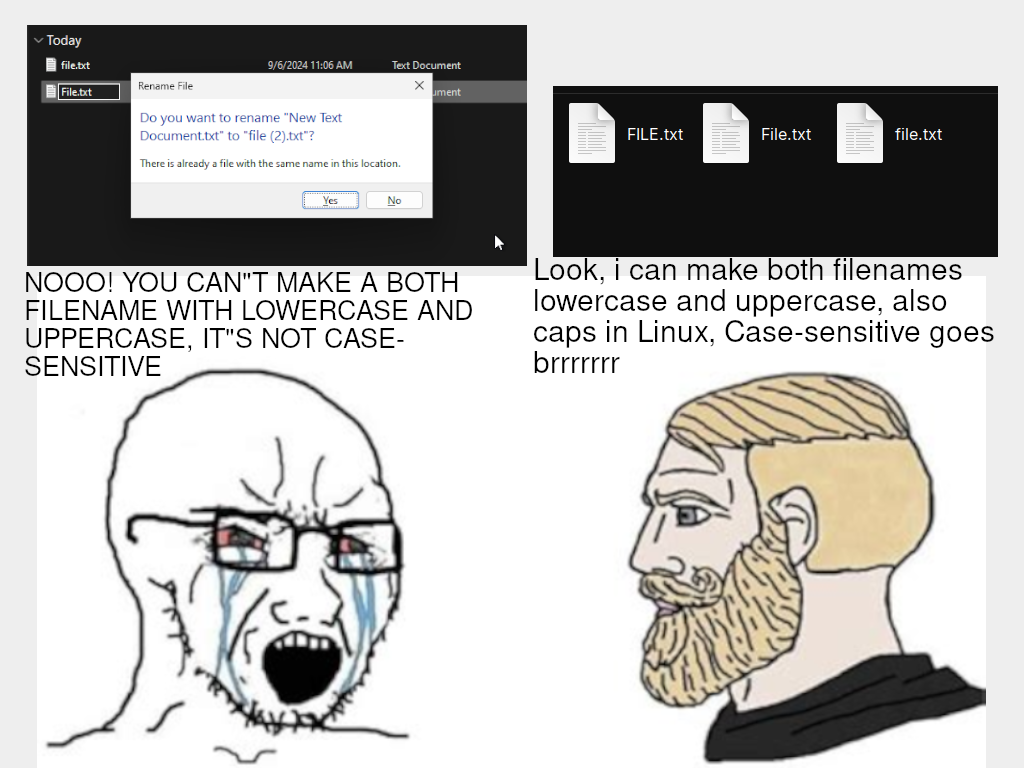I prefer case sensitive but I guess that's just me
linuxmemes
Hint: :q!
Sister communities:
Community rules (click to expand)
1. Follow the site-wide rules
- Instance-wide TOS: https://legal.lemmy.world/tos/
- Lemmy code of conduct: https://join-lemmy.org/docs/code_of_conduct.html
2. Be civil
- Understand the difference between a joke and an insult.
- Do not harrass or attack members of the community for any reason.
- Leave remarks of "peasantry" to the PCMR community. If you dislike an OS/service/application, attack the thing you dislike, not the individuals who use it. Some people may not have a choice.
- Bigotry will not be tolerated.
- These rules are somewhat loosened when the subject is a public figure. Still, do not attack their person or incite harrassment.
3. Post Linux-related content
- Including Unix and BSD.
- Non-Linux content is acceptable as long as it makes a reference to Linux. For example, the poorly made mockery of
sudoin Windows. - No porn. Even if you watch it on a Linux machine.
4. No recent reposts
- Everybody uses Arch btw, can't quit Vim, and wants to interject for a moment. You can stop now.
Please report posts and comments that break these rules!
Important: never execute code or follow advice that you don't understand or can't verify, especially here. The word of the day is credibility. This is a meme community -- even the most helpful comments might just be shitposts that can damage your system. Be aware, be smart, don't fork-bomb your computer.
oh for fucks sake, don't make me have to worry about the case of filenames.
To my knowledge since Windows 10, files can be case sensitive. It is still tricky to setup, but it won't break.
Nah, Windows still fucks it up. I was forced to use Windows 11 for a code generation tool from a chip vendor the other week and it screwed everything up by inserting references to a directory with different cases than how it was actually created.
That's more likely to be the tool assuming it's running on a case-insensitive filesystem than it is Windows breaking anything. If you mount networked storage running on a case-sensitive machine, that's something that's worked fine in Windows for a very long time.
you can also use basically anything that's not / in a file name as well, it's pretty based. Meanwhile on windows you have to use SMB mappings if you don't want your directory structure to self immolate, what a good operating system.
Thought experiment: Would you expect a programming language variable name to be case insensitive?
That is, if you set foo = 1 and then print FOO, what should happen? Most programming languages throw an error.
Is this even comparable with filenames, which are, after all, basically variable names that hold large quantities of data?
If there is a difference, is it the fact it's a file, or - for a mad idea - should files with only a few bytes of data retain case insensitivity? And if that idea is followed through, where's the cutoff? 256 bytes? 7?
(Anyway, Windows filenames are case sensitive, in a sense. If you save "Letter to Grandma.txt" it will retain those two capital letters and all the lower case letters exactly as they are. It won't suddenly change to "LETTER to Grandma.txt", despite the fact that if you try to open a file by that name, you'll get the same file.)
file.txt
file.TXT
file.tXt
etc
